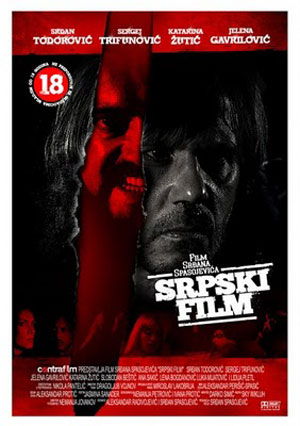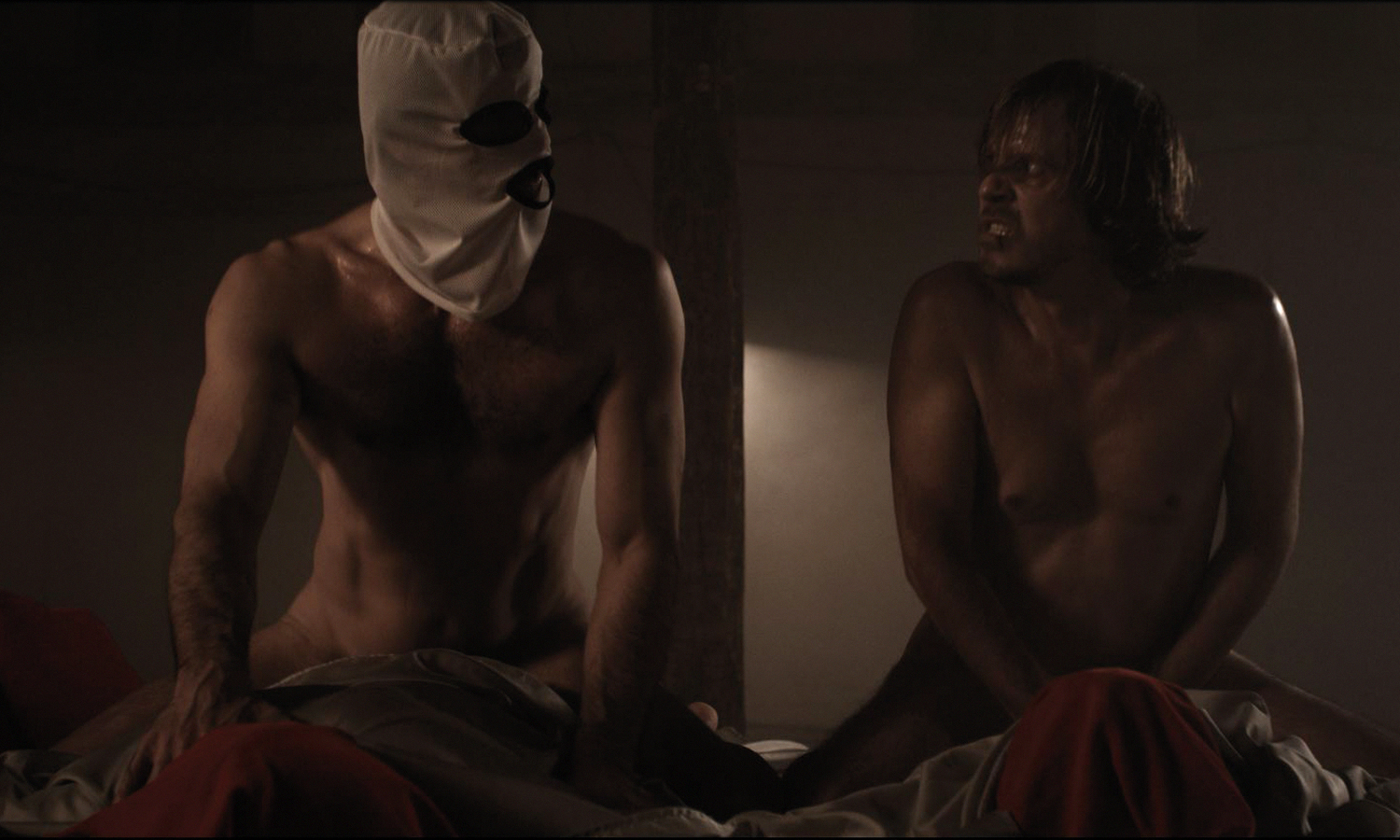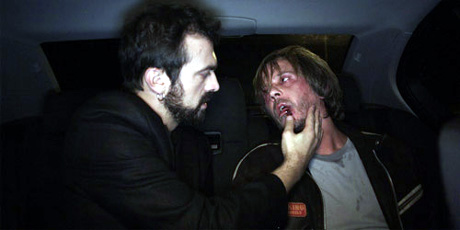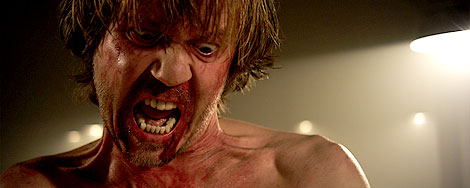SXSW 2010 Review: Serbian Film

When the closing credits of Serbian Film began to roll, I could only sit paralyzed with my mouth drooping slightly and my eyes glazed over as I processed what I had just seen. My brain seemed unable to produce any sort of coherent thought, let alone come up with an answer to the question of what to do next. How should I respond? I spent the remainder of the evening not wanting to say much to anybody, preferring to sit in silence and attempt to figure out... something, I'm not sure what. I wanted to cry. I wanted to laugh. I wanted to scream. I wanted to have sex. I wanted to castrate myself. And I wanted all of these things equally. At some point during the climactic scene, I realized that I was a living example of the phrase "physically shaken," my arms and legs spasming like some sort of micro-seizure. It would not be an exaggeration to say I was reduced to a quivering mess of a man; Serbian Film chewed me up and spat me out, and that was that.
To call Serbian Film a visceral experience would be an understatement. It is an explosion of angst and depression that raises a giant middle finger to the world before promptly shoving it up your ass. This is one of the angriest films I've ever seen, and undoubtedly the most disturbing. You won't enjoy this film, but you'll damn well remember it.
It's ironic that I screened the film the same day I attended a panel bemoaning the amount of hyperbole in film criticism today. This is a film so graphic that it will be difficult for people to discuss it in anything other than extremes. There will be those who champion this movie for its boldness, its artistic vision, and its uncompromised look at the human condition. There will be others who slam it for... well, the exact same reasons. This is not a film that can be shrugged off or ignored once it has been seen, and that fact alone will probably help it gather a cult following, regardless of its theatrical distribution.

The entire second half of Serbian Film is a barrage of extreme sex acts so taboo that to reveal them would diminish their power. And if there's anything these filmmakers have claimed to not want, it's the sanitation of violence into something socially acceptable. Suffice to say, you've never seen (and hopefully never even imagined) the kinds of horrific acts that take place.
I had the opportunity to interview the writer of Serbian Film, Aleksandar Radivojevic, and during our conversation it became clear that this is more than just another torture porn film. This is not graphic violence for the sake of graphic violence, but an exploration of systemic oppression, the manipulation of power, and the very definition of art. The film wears its metaphors on its sleeve, but there's still so much being communicated it doesn't feel preachy or melodramatic. As Radivojevic explained to me, Milosh is a porn actor not simply because that will lead to more disturbing developments, but because, "Life is porn." We live in a world in which we sell ourselves, no matter what our profession, to forces that may potentially abuse and manipulate us. Ironically, in the name of "freedom" and "consumerism" we voluntarily become victims of social and economic injustice and wrapped in a web of manipulation that we can't escape. It would not be a stretch to say that Serbian Film is the most blantant call for the abolishment of capitalism since the Communist Manifesto. The message it conveys is that our socio-economic system is not merely flawed, it is inherently evil, a prison in which not even the perpetrators of injustice are in control of their own actions. The drive to make money, the willingness to sell oneself for a check or in the name of art, can never lead to anything but victimization.

Strangely, it is the film's villain that most fully embodies the beliefs of Spasojevic and Radivojevic. Like Vukmir, they feel there should be no boundaries in the pursuit of art. The question thus becomes whether or not to view the duo as serious artists or merely as madmen who ultimately harm society with their art more than help. We, the audience, are the protagonists in the story they've crafted, and like Vukmir they abuse us for our own enlightenment. Are they cinematic geniuses, or just insane? Perhaps, unlike Vukmir, they're a healthy bit of both.
In a stunning example of postmodern, self-reflective filmmaking, one of the last lines of the movie is an ecstatic cry of, "This is cinema!" This is a film that accomplishes that which all great art strives to achieve: to speak to us not merely as consumers of entertainment, but as human beings. Like Vukmir's "art," cinema has the ability to abuse, desensitize, and destroy. But paradoxically, it is this destructive power which also gives it the ability to encourage, critique and create. It takes us places we never anticipated going, and hopefully we emerge from the journey irrevocably better than when we first set out. Serbian Film took me to the darkest corners of my soul, and when the credits began to roll I exhaled the thankful breath of someone who has seen the worst side of himself and survived. It was not a pleasant trip, but I'm glad I took it.
A final word about the graphic nature of the film: While I feel the explicit imagery enhances the film's power, I am not sure this necessarily means the makers of Serbian Film should be immune from criticism regarding the content. Radivojevic argued (rightly so) to me that our culture has become so desensitized to violence that the only way to truly communicate victimization is to be uncompromising in its depiction. We must feel every atrocity in our gut, lest we forget that it is in fact an atrocity. I worry only that if Serbian Film finds a following and is successful, we will see copycats and subsequent films that ignore its thematic depth and are similarly depraved simply for shock value. If we are so spiritually paralyzed that only something like Serbian Film can shake us awake, what happens when even content this disturbing becomes the norm?
While we can learn much about ourselves and our world by exploring depravity, it's foolish to believe we as a species will be able to explore ever-darker regions of our hearts frequently and remain immune from their effects. Though I wish more films as bold and provocative as Serbian Film were made, we should not forget the intentions that led to its creation, lest its graphic nature one day be considered the accepted norm. Even those of us that appreciate Serbian Film need to be willing to take a cold, hard look at the issues related to releasing a film this graphic. We must continue to question the merits of showing such extreme acts in such explicit detail, even if ultimately there are no clear answers. There must never come a day when Serbian Film is easy to stomach. For if that day ever arrives, then like all of its major characters, we and our descendants truly are f*cked.
